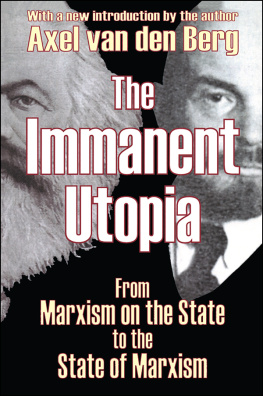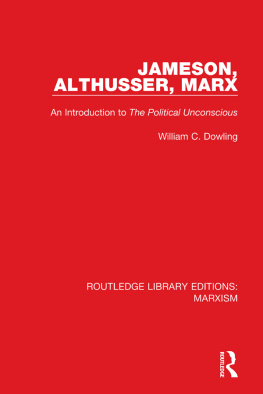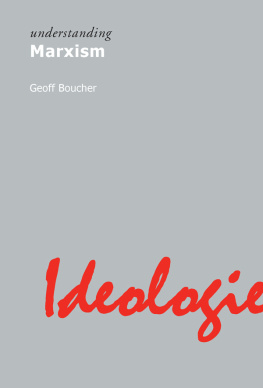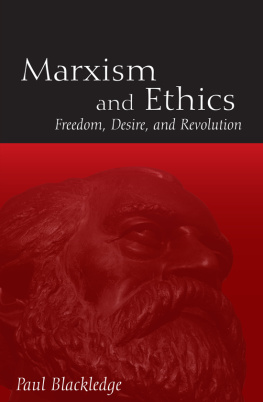Originally published by Princeton University Press in 1988.
Published 2003 by Transaction Publishers
Published 2017 by Routledge
2 Park Square, Milton Park, Abingdon, Oxon OX14 4RN
711 Third Avenue, New York, NY 10017, USA
Routledge is an imprint of the Taylor & Francis Group, an informa business
New material this edition copyright 2003 by Taylor & Francis
All rights reserved. No part of this book may be reprinted or reproduced or utilised in any form or by any electronic, mechanical, or other means, now known or hereafter invented, including photocopying and recording, or in any information storage or retrieval system, without permission in writing from the publishers.
Notice:
Product or corporate names may be trademarks or registered trademarks, and are used only for identification and explanation without intent to infringe.
Library of Congress Catalog Number: 2003053729
Library of Congress Cataloging-in-Publication Data
Van den Berg, Axel.
The immanent Utopia: from Marxism on the state to the state of Marism / Alex van den Berg ; with a new introduction by the author.
p. cm.
Originally published: Princeton, N. J.: Princeton University Press, 1988.
Includes bibliographical references and index.
ISBN 0-7658-0517-0 (alk. paper)
1. Marx, Karl, 1818-1883. 2. Communist state. I. Title.
HX39.5.V266 2003
335.4dc212003053729
ISBN 13: 978-0-7658-0517-1 (pbk)
It is necessary to reverse the common opinion and acknowledge that it is not the harshness of a situation or the sufferings it imposes that lead people to conceive of another state of affairs in which things would be better for everybody. It is on the day that we are able to conceive of another state of affairs, that a new light is cast on our trouble and our suffering and we decide that they are unbearable.
(Jean-Paul Sartre, Being and Nothingness)
Why Bother with Marxism? is the opening title of a recent book on Marxism and Social Science (Gamble, Marsh, and Tant 1999). Good question. For over a decade now, Marxism, both in theory and in practice, seems to have been in amazingly precipitous and irrevocable decline. Publishing-let alone republishing- a massive tome on the arcana of Marxist state theory at this point would seem to give the notion of flogging a dead horse an entirely new dimension.
It all happened with dizzying speed. When I completed the first version of this book as my dissertation in 1985, I was consciously trying to tackle what was widely touted as the single most promising and vibrant exemplar of the triumphant revival of academic Marxism: the Marxist theory of the state. At the time, my criticisms of these celebrated new theories seemed to go entirely against the current. It took almost three years and several acrimonious exchanges with anonymous reviewers to finally get the book published in 1988. But by that time, the tide had already turned; so much so, in fact, that one of the authors whose work I had criticized was already able to dismiss it as an old-fashioned book (Block 1990, 1057)!
The unmistakable signs of decline and decay have been accumulating around us ever since. In the realm of practice there was, of course, the spectacular crumbling of the entire world of Soviet-dominated communism. Some Marxists have, perhaps engaging in a bit of wishful thinking, hailed the The Fall as the liberation of real Marxism from its awkward association with real existing socialism (see e.g., Burawoy 1990, 792), insisting, somewhat contradictorily, that it need hardly be said that Marx and Engels had something else in mind than the Soviet Union when they thought of communism (Burawoy 2000, 153). The purported liberation does not appear to have inspired much renewed revolutionary fervor among the oppressed masses, though. Nor has it done much to stem Marxisms equally spectacular slide in the realm of theory, that special domain of Western Marxism.
There is little doubt that in terms of plain output at least, the heyday of academic Marxism has passed. Even a cursory inspection of the offerings in the standard social science journals, including the explicitly Marxist or merely marxisant, suggests that the proportion of articles dealing with aspects of Marxism has been in fairly steep decline since the renaissance of the 1970s. And much of the content of those articles has taken on a distinctly defensive tone compared to the days of the much-proclaimed crises of late capitalism. The entry on Marxism in the recent Handbook of Social Theory is entitled Maintaining Marx (McLennan 2001). It is mostly devoted to a discussion of the Marxist predictions that have failed and the many conflicting interpretations of Marxist doctrine spawned by the ambiguities and inconsistencies in Marxs own writings. One of the most-cited marxisant journals these days is called Rethinking Marxism. There is now, in spite of the absolute as well as relative decline in the number of books and articles published about Marxism, a spate of books and articles claiming to resurrect, reconstruct, and/or reinvent Marxism.
One telltale sign of a paradigm in trouble is when its proponents resort to increasingly abstruse epistemological argumerits in order to dismiss plain evidence appearing to refute it. There is a long history of this in Western Marxism. In fact, to a large extent this is the history of Western Marxism: the evermore complicated philosophical dismissal of the mere surface appearances that seem to negate the theorys well-known predictions (Anderson 1976). This is what the Hegelianization of Marxism, begun by Lukacs, Korsch, and the early Frankfurt School, was largely about: it was an attack on the bourgeois positivism that took the reluctance of the working class to act out Marxisms predictions to be an effective refutation of the theory. Significandy as well as ironically, Althussers structuralist Marxism, which supposedly purged Marxism of all non-scientific traces of Hegelianism, amounted to much the same thing: a resolute rejection, on allegedly advanced epistemo-logical grounds, of the plainly unfavorable empirical evidence. of this book traces a part of this particular variant in some detail. The more recent retreat of what remains of the Left in academia to the higher ground of wholesale relativism, in the form of postmodernism, poststructuralism or postmarxism, is in some respects simply a generalization of this denial of the unpleasant realities before us-in favor of the more agreeable pursuits of academic distinction and tenure.
Burawoy (1990) provides an interesting example of this type of manoeuvre in his reassertion of Marxisms scientific credentials on Lakatosian grounds. The very variety of responses to unforeseen historical circumstances that can be seen in the writings of the likes of Luxemburg, Lenin, Trotsky, Lukacs, and Gramsci, Burawoy argues, shows that Marxism is a vibrant, progressive research program in Lakatoss sense. Quite apart from the rather peculiar collection of early twentieth-century political activists, not social scientists, that Burawoy appeals to for scientificity, it must be said that this is not a terribly impressive defense. First, Burawoy finds it necessary to amplify certainelements [of the methodology of scientific research programs] that remain undeveloped in the writings of Lakatos and his students (Burawoy 1990, 778). But this amplification (ibid., 779) turns out to have the effect of construing Lakatoss standards so loosely that any










